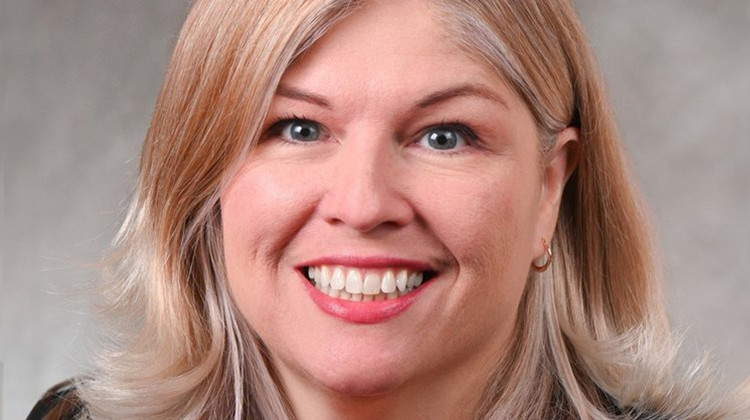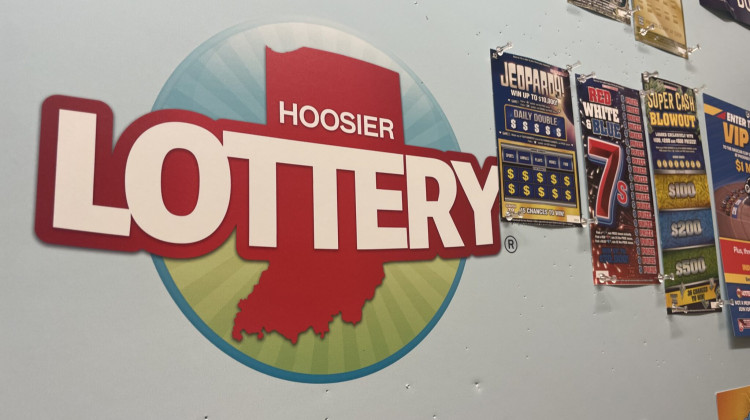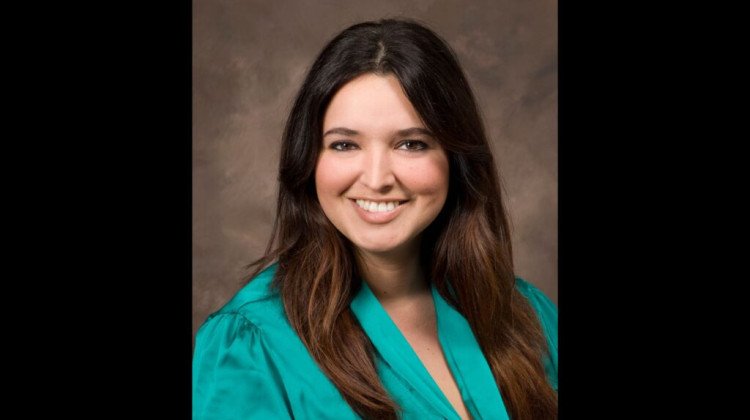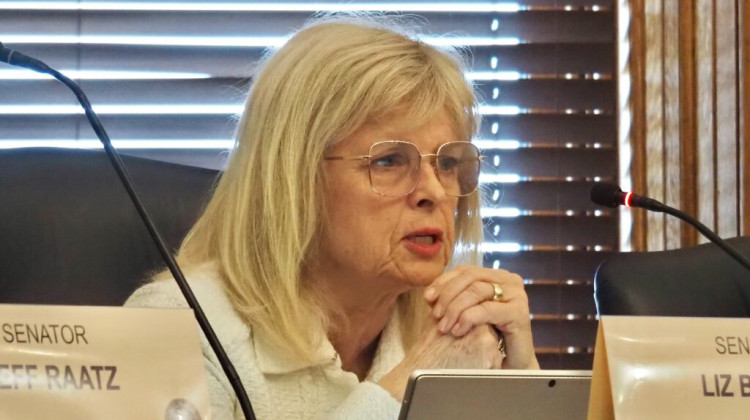
Lauri Shillings has a background as a multimedia professional. She has served as chair of the Libertarian Party of Hamilton County since 2021.
Photo from Lauri Shilling's campaign websiteWFYI is speaking with U.S. House of Representatives candidates running for election in Central Indiana.
Libertarian Lauri Shillings is running for office in the 5th Congressional District, which represents parts of Hamilton, Madison and Howard counties. She faces incumbent Republican Victoria Spartz, Democrat Deborah Pickett, and Independent Robby Slaughter.
Shillings has a background as a multimedia professional. She has served as chair of the Libertarian Party of Hamilton County since 2021.
WFYI’s Abriana Herron met with Shillings to discuss why she’s running for the seat.
This transcript has been lightly edited for clarity and style. WFYI fact checks all candidate interviews and provides editor’s notes in the audio and digital publications.
Abriana Herron: So why are you running for election in District 5?
Lauri Shillings: So, I'm running for election in District 5 because I think that a lot of the representation we have in government doesn't really represent the people who live there. You know, I've been in Indiana for the majority of my life. My father's been in civil service. My mother was too, and I see a lot of people who are really out of touch with people who work, live and grow in that community, and I think I can really relate to them in a way that's beneficial for them.
Herron: So what are the most important issues that you believe voters face in the district today?
Shillings: I think some of the more important issues are going to be their educational choices, I think over-taxation and then just trying to maintain a balanced budget in the government.
Herron: Housing is becoming more unaffordable for people. What measures do you believe could improve housing for District 5 voters?
Shillings: So District 5 is kind of a dichotomy of people. When you get closer to Indianapolis, it's really high density, and I will say it's probably a better standard of living. When you go into the rural areas in the northern part of District 5, you have a lot of farmland. You have a lot of small towns who suffer because they don't have the industry or the tax base. I think one of the better things that we can do to try to maintain housing affordability is try to restrict corporate entities from purchasing all of the single family homes.
And then secondary is going to be ordinances that claim, hey, you have to have a certain value on the house before you can build a subdivision. So they're out-pricing first family homes, single parents, people who are individuals – they simply can't even afford an apartment, let alone a home if they want to have investment in their real estate. So I think that's probably a lot of it is restricting those kinds of entities from just dominating those markets and preventing anyone else from getting into it.
Herron: This kind of goes into my next question, the economy. It's top of mind for many voters. How would you support policies to improve inflation and create more opportunities for organizations like small businesses and farmers?
Shillings: So economy is a big thing on everyone's mind right now, because it costs a lot more to purchase your daily grocery bill. It costs a lot more to put gas in your car. And this is, you know, I like to look at it kind of a high level view of that. And you know, when you look at inflation, it comes down to spending more than you earn. And you know, the government doesn't make any money on its own. It's all money taken from taxpayers, from their paychecks. And when you're losing 25 to 35%* of your money to the government, who's not really representing you, that's a real hard thing for individuals to take. So if they had some of that back, it would be great.
And inflation is again, when you spend more money than what you have. We need to take a really hard look at the United States government spending. What is it being spent on? And how is it being spent? Is it beneficial to the American people? Is it truly benefiting us here at home, rather than on foreign soil? So, you know, it's $36 trillion is our debt right now and growing,** if it's not beyond that, you know, even a 10% cut is a huge bite off of that debt, and that's going to help us with our profile.
As far as you know, what we're going to be spending, how we're going to be spending it on, you know, the military budget is enormous, and right now, I don't think we need to keep spending that kind of money on our military overseas. If we have that money reduced from our debt, then it might be beneficial to either apply that to our existing debt so that we can reduce that as much as possible, or allocate it in ways that are more beneficial to the American people.
*Editor’s note: The percentage paid in state and federal taxes varies based on income. Here is a link with more information on income taxes in Indiana. And here is a link with more information on federal income taxes.
**Editor’s note: You can track the national debt daily at the Peter G. Peterson Foundation National Debt Clock.
Herron: Like homelessness efforts and things along that nature.
Shillings: There are societal problems that need to be addressed as well. Tax dollars could be part of that. There could be a better way to encourage small businesses to come in and step in that area too, where, you know, I'm actually going to go do some service work tomorrow with feeding team.org in Hamilton County, where we go clean, help, stock, reorganize, feeding pantries, food pantries all over the county.
And you know, it's those, kind of, like nonprofit industries that really step in and provide services, where the government's not able to. Or sometimes in a better way than the government will – without those kind of obstacles.
So, you know, I always look back to things like in Florida, where there's nonprofit groups who try to feed homeless people on a regular basis, but the government steps in and says, “You can't do that.” It's not allowed to actually pour bleach on their food before giving it to the homeless. They'll throw it away because it's not allowed by ordinances.* And I'm like, Why? Why would you do that? The government's obviously not helping, but individuals are trying to. So allow them to do so in a way that's beneficial for their communities.
*Editor’s note: WFYI News could not find any information on this incident in Florida, but did find reporting about a similar incident. Some grassroots feeding groups have dealt with difficulty distributing food because of city ordinances.
Herron: And so public safety and violence is also an increasing issue in many communities in the district. How do you propose reducing gun violence in the area?
Shillings: Well, we have to look at what causes the violence in the first place. You know, guns. People will say gun violence. Guns are the problem, perhaps. I am a gun advocate for well educated gun owners, responsible gun ownership. People who are irresponsible are not trained, that's when accidents happen.
But I want to go deeper into that, because it is a societal problem, because people who are desperate will do desperate things if they don't have any hope or any kind of quality of living. Or if they are over, or under, in debt, they're going to do desperate acts to try to take care of themselves, because they don't think anyone else will do it for them, or they don't feel that they have the opportunity to do it.
So as a societal lens, gun violence probably needs to take a deeper dive into why people are doing that. Why are they so desperate? Is it because they don't have housing and they need money? Is it because of addiction, which is also a societal issue? It becomes a healthcare issue rather than a crime issue, at that point. It's multifaceted. There's no one clear answer, but it needs to be addressed.
Herron: And going into health care, there are many communities that are facing a lack of healthcare access, and health care costs are on the rise. What policies do you believe would help when it comes to healthcare?
Shillings: Insurance companies are probably the number one issue when it comes to health care costs. They have protectionism at the lobbyist level. In Washington, they have reason to feel like they are entitled to charge a certain amount of money. The US government isn't allowed to negotiate Medicare with them on any, you know, meaningful basis, because it's been packaged in policy to protect individual industries.*
If we had more of a free market when it comes to health care, rather than a protectionist way of saying, hey, insurance, you're guaranteed X amount of money, because no one's going to confront you about it, because that's just how life is. You know, I've struggled with medical bills myself, and had to make monthly payments over a year's worth of time.
And it you get to the point where you're like, “Why do I even have insurance if I'm going to end up paying this amount of money all the time, every month anyway – if not in, you know, my premiums, then at the hospital or for urgent care – because it's just quicker, easier, faster to get service at an urgent care, but it's twice the price.”** So I think that that particular issue with health care comes down to protectionism and insurance companies lobbying their way into policy that protects them.
I also think that with a free market kind of approach to that, If you look at LASIK, right, here's an example. They went into the free market. It's considered cosmetically something. It's not necessary. You could always put on a pair of glasses, but LASIK had to become very competitive, and so their prices went down, and only the best providers remain in service. So if we had something similar to that for our health care.
I know a lot of people who went to a subscriber-basis, doctors who went out of business when they couldn't afford their malpractice insurance or what have you. Let's say the premiums are so high, so they went into a subscriber service where it's like, “Ok, I'm going to take 10 or 20 patients, and I will see you all the time, but you pay a monthly fee. It's cheaper than your insurance. I will come help you do whatever you need.” And it's, it's, it's affordable for the individual, and it's affordable and profitable for the care provider.
*Editor’s note: The federal law does limit the government’s ability to “negotiate” rates charged by private Medicare plans, both Congress and the Centers for Medicare and Medicaid Services have some power over what both taxpayers and consumers pay for this coverage.
**Editor’s note: Urgent care is not typically more expensive than primary care but prices can vary and are influenced by insurance.
Herron: And so reproductive rights is also very huge here in Indiana, and on the tops of minds of a lot of our voters, what’s your opinion on women's health care?
Shillings: Women's health care is health care. It shouldn't matter what gender you are. It shouldn’t matter what gender you claim to be. You are a human being, and you deserve health care. My personal belief on women's reproductive rights is – that is between the woman, their physician and their faith. Nobody else needs to be involved. Politicians are not physicians you know, religious groups, they're not physicians either. So let the person who has the most experience take care of that issue. It's really none of my business, and it shouldn't be the government's business either.
Herron: And environmental change is impacting communities in your district – from agriculture to water. What type of protections or policies would you like to see?
Shillings: So water rights are a big thing, and water tables are a big thing in rural communities, because if there isn't enough, then farmland doesn't get the irrigation it needs to raise crops or livestock, right? We have a lot of opportunities in the district right now, where there's some tech companies coming in on the north side, and it is ranges on the border of the fourth district as well, but it's the same water table in that area.
So when you're specifically talking about that, I think that there needs to be a deep conversation between all entities to ensure that they're all favorable. And if one obviously benefits over the other then maybe that industry needs to seek a different location where it's not as populated or doesn't produce food for the nation.
Now, business owners and politicians everywhere will be sad about that statement, because of the tax base, right? It's going to bring jobs in, it's going to bring tax money in, but when they're offering abatements and things where they're not going to pay tax for 20, 30 years, or it'll be grandfathered in over and over again. Is it really benefiting the community that it's located in? Is it really? And climate issues will be a thing with that too, because you're going to have all kinds of technology runoff, and it needs to be properly recycled and treated in a way that's not harmful to the climate.*
It's a big thing that's coming in and, I mean, it can be a great boon for the economy, great, but are we sacrificing one of the last remnants of a food producing area for technology in order to get tax dollars out of it? That's a concern.
I mean, I'm all for business doing what they need to survive. But if they have government protectionism when it comes to that kind of stuff, where it's like, okay, we've given you everything in the world, just set up shop. Then is it really benefiting the community? Are those tax dollars well spent? And how long will that be a benefit for the community? And if those tax dollars are still being abated and not being given back to the community that they're supposed to be in, especially when it comes to services.
For, you know, schooling, it's going to increase the population. If people move there to work in these areas, it's going to increase fire service, police service, all the infrastructure that has to go to support it, and then all those communities who grow and thrive and have to be supported as well. So, I mean, and that tax dollar comes from property values, right? And when, if, especially if it's a TIF district, let's say that money doesn't necessarily go into the property tax base. It goes into a piggy bank for economic development, and then they can spend it however they want.
So I mean, that needs to be looked at pretty heavily. I always think that tax dollars need to be allocated back to the people who give it to you, rather than to corporation handouts, who ought to be successful on their own with their profit margins.
*Editor’s note: The LEAP project is planned as part of a technology and manufacturing corridor along I-65 in north central Indiana. The project has received criticism as the state continues to fund development amid uncertainty about water use. Tax abatements for companies are often part of economic development deals made by the state.
Herron: Can you tell us who you're backing for Indiana governor and U.S. president in the upcoming election?
Shillings: I'm going to be voting for Donald Rainwater for our governor. He's our Libertarian candidate. I have known him for more than four years. I worked on his campaign in 2020 as his creative director, and he, you know, I like to say I vote for the best person for the job. As a libertarian, we don't necessarily believe in straight-ticket voting. We'd like to see Indiana as one of the last remnants of [states that vote] straight-ticket be gone.
That way, people actually have to think about who they're voting for, rather than just pushing an R, D or an L at the beginning of the screen. So I think Don's actually going to be a great candidate. I think he would be a wonderful governor. He has good ideas about how to manage spending and budget and to make sure that the population in Indiana is taken care of, and, when it comes to [it], how government services support them.
My presidential candidate is going to be [Libertarian candidate] Chase Oliver. He is elevated in a way that I think is great. Full disclosure, I do work on his campaign team, but that doesn't prevent me from rooting for others if they are a better person for the job. I think Chase is a wonderful individual, and he has good ideas about the economy and how he's a strictly antiwar candidate, which I support 100% you know, as a libertarian.
I don't believe in aggression or an aggressive tactic when it comes to how people obtain things. If you're not hurting anybody and not taking their stuff, the government really shouldn't be involved. And so I like to find people who are aligned with that and support them to the best of my capability, all right?
Herron: And then my final question for you today is, would you like to add anything that you believe people should know about you?
Shillings: I am a mother of two children. I've lived in Indiana the majority of my life. I spent a couple years out of state in my youth, so to speak, but I've been here my whole life. And so I was called to service, because I believe if I don't step up and try to have my voice heard and try to represent others who are like me, who will do that? Rather than be dominated by the news that you see everyday, talk to your neighbors, see what they really believe in, have conversations with them, and then go make a vote that represents them.
Herron: All right well, thank you so much.
Shillings: Thank you so much for having me today. I appreciate it.
 DONATE
DONATE






 Support WFYI. We can't do it without you.
Support WFYI. We can't do it without you.